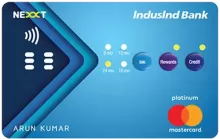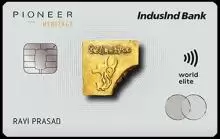IndusInd Bank Platinum RuPay Credit Card
The IndusInd Bank Platinum RuPay Credit Card is great for people who often use UPI for payments. It gives 2 Reward Points for every ₹100 spent on UPI apps like Google Pay, PhonePe, and Paytm, and 1 Reward Point per ₹100 on other transactions. Since RuPay cards work well with UPI, more banks are offering them. This IndusInd Bank Platinum RuPay Credit Card is also lifetime-free, making it a good option for both new and experienced users.
However, its benefits are limited compared to other credit cards. The reward rate is low at 0.40%, and while points can be converted to KrisFlyer Miles, the conversion rate isn’t great for travelers. The card also comes with welcome vouchers from brands like Postcard Hotel and Mont Blanc, but they may not be a big attraction. Overall, this card is best for those who use UPI often and want a simple way to earn rewards while building their credit score.
Rewards and Benefits
Fees & Charges
What should you consider before applying for a credit card in India?
Key Considerations Before Applying for a Credit Card in India:
- Eligibility Criteria: Ensure you meet the eligibility requirements, which typically include age, income, credit score, and employment status as defined by the issuing bank or financial institution.
- Credit Score: A strong credit score can significantly improve your chances of approval and result in more favorable terms, such as lower interest rates or higher credit limits. Verify that your credit score is healthy before applying.
- Interest Rates and Fees: Compare the annual percentage rates (APR), processing fees, late payment penalties, and foreign transaction charges associated with various cards. These costs can vary widely and impact the overall value of the card.
- Rewards and Benefits: Evaluate the rewards, cashback, discounts, or other perks offered by the card to ensure they align with your spending patterns. Some cards may provide better benefits in specific categories, such as travel, shopping, or dining.
- Credit Limit: Review the credit limit offered by the card to ensure it meets your financial needs. Avoid applying for cards with excessive limits if you are concerned about managing debt, as this can lead to higher interest charges.
- Repayment Terms: Understand the repayment structure, including the minimum payment amount, payment due dates, and any associated penalties. Being clear about these terms can help you manage payments effectively and avoid interest buildup.
- Card Type and Features: Choose a card type that matches your specific needs—whether standard, premium, or specialized cards like those offering travel rewards or dining privileges. Ensure the features of the card align with your lifestyle and spending habits.
- Bank’s Reputation: Opt for a financial institution with a proven reputation for customer service and transparency. Consider researching customer reviews and assessing their support channels to ensure reliable service.
- Hidden Charges: Be aware of any hidden fees, including annual fees, balance transfer charges, foreign transaction fees, or cash withdrawal charges. These can add up over time and affect the overall cost-effectiveness of the card.
- Credit Utilization: Maintain a balance within your credit limit to avoid high credit utilization ratios, which can negatively impact your credit score. Responsible use of credit is essential for maintaining financial health.
- Long-Term Financial Plans: Consider how the credit card fits into your overall financial strategy. Avoid accumulating unnecessary debt and choose a card that supports your long-term financial goals without adding financial strain.
Can I use this card for UPI payments?
Yes, you can link your IndusInd Bank Platinum RuPay Credit Card to UPI apps like Google Pay, PhonePe, Paytm, and BHIM for easy transactions.
How do I make UPI payments with this card at a store?
Just scan the shop's QR code or type their UPI ID, pick your credit card to pay, enter your UPI PIN, and confirm the payment.
Does this card have any annual fees?
No, it is a lifetime-free card with no annual or renewal charges.
What rewards do I get on transactions?
You’ll earn 2 reward points for every ₹100 spent through UPI, and 1 point for every ₹100 spent through other payment methods.
Can I redeem my reward points for travel or other benefits?
Yes, you can redeem your reward points for travel, shopping, and other rewards.
Does this card offer lounge access?
No, this card does not come with complimentary lounge access.
What is the fuel surcharge waiver?
You get a 1% fuel surcharge waiver on transactions between ₹400 and ₹4,000 at petrol pumps across India.
What travel insurance benefits does this card offer?
It covers lost baggage, delayed baggage, lost passport, lost tickets, and missed connections, provided by the Oriental Insurance Company.





Leave a Reply